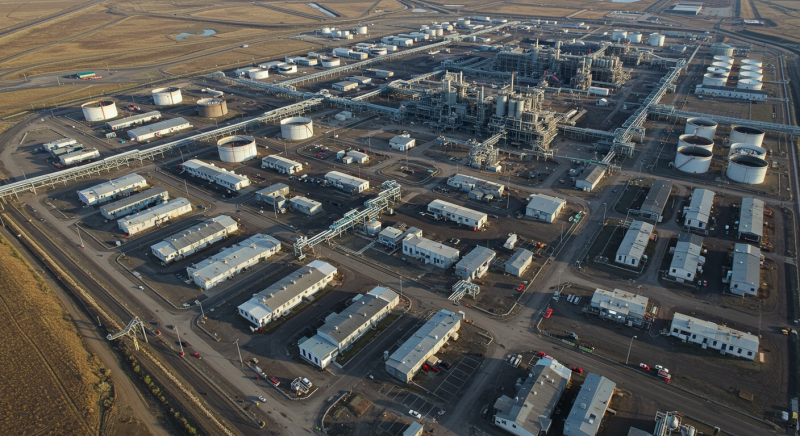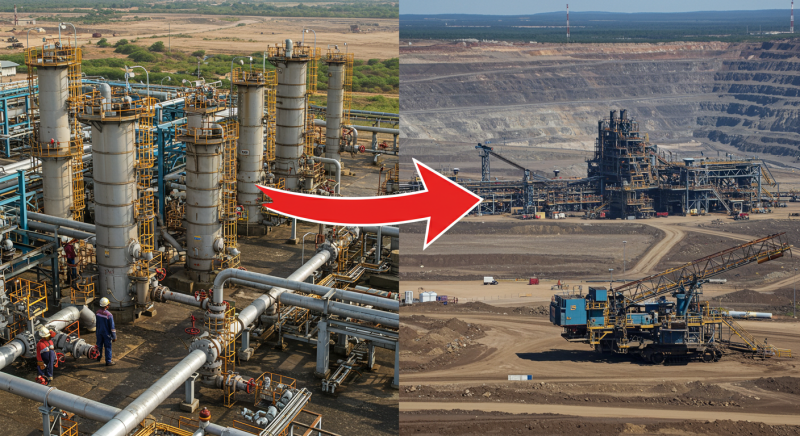Picture this: You’re sitting in your Lagos office, scrolling through endless job boards, watching your engineering degree gather dust while dreaming of a career that truly rewards your skills. You’ve heard the stories from friends who made it to Canada’s booming oil and gas sector, earning salaries that seemed impossible back home. That dream doesn’t have to remain a dream. Today, we’ll unlock the proven strategies that have helped thousands of Nigerians successfully transition to Canada oil and gas jobs, transforming their careers and lives forever.
Key Takeaways
Before we dive deep into this comprehensive guide, here are the essential points you’ll master:
- Understanding the current landscape of Canada oil and gas jobs and why Alberta remains the goldmine for opportunities
- The exact certifications and qualifications that make Canadian employers say “yes” to your application
- Insider knowledge about the most effective recruitment agencies and job search strategies
- Step-by-step process for navigating work permits and immigration requirements
- Proven networking techniques that open doors to hidden job opportunities
- Realistic salary expectations and cost of living considerations
- Common mistakes to avoid that derail most applications

Why Canada’s Oil & Gas Industry is Your Gateway to Financial Freedom
Canada’s energy sector continues to be a powerhouse despite global economic shifts. According to recent government data, the oil and gas sector supports 400,000 jobs across the country, and this number keeps growing as the industry recovers and modernizes. For skilled Nigerians, this represents unprecedented opportunities to build wealth and establish successful international careers.
The statistics paint a compelling picture. Current job boards show over 2,000 active oil and gas positions across Canada, with many companies actively seeking international talent to fill skill gaps. About 150,000 people are employed across various roles in the energy sector in Alberta alone, making it the epicenter of Canada oil gas jobs.
What makes this particularly exciting for Nigerians is that our educational background and work experience in the petroleum industry align perfectly with Canadian requirements. The technical expertise developed in Nigeria’s oil sector, combined with the right certifications and approach, creates a winning combination for landing Canada oil gas jobs.
Understanding Alberta’s Job Market: Where Dreams Become Reality
Alberta stands as Canada’s energy capital, hosting the majority of Canada oil and gas jobs opportunities. The province’s economy revolves around energy production, creating a ecosystem where skilled professionals can thrive. Alberta and British Columbia produce 98% of Canada’s natural gas, making these provinces the primary destinations for energy professionals.
The job market in Alberta offers diverse opportunities across multiple sectors within the energy industry. From upstream exploration and production to downstream refining and distribution, the province provides pathways for professionals at every career stage. The recent stabilization of the industry following the COVID-19 pandemic has created renewed optimism and increased hiring activity.
Current market trends show strong demand for roles in project management, engineering, operations, and technical support. Companies are particularly interested in professionals who can bring international experience while adapting to Canadian standards and practices. This creates an excellent opportunity for Nigerian professionals who understand both local and international best practices.
Understanding the seasonal nature of some Canada oil and gas jobs is crucial for planning your career transition. While many positions offer year-round stability, some field-based roles may have seasonal variations that affect both availability and compensation structures.
Essential Certifications That Open Doors to Canada Oil Gas Jobs
Success in securing Canada oil gas jobs heavily depends on having the right certifications recognized by Canadian employers. The certification landscape can seem overwhelming, but focusing on the most valued credentials will significantly improve your chances of success.
Professional Engineering (P.Eng) Designation
The Professional Engineering designation represents the gold standard for technical professionals seeking Canada oil and gas jobs. This certification demonstrates your ability to practice engineering independently in Canada and significantly increases your marketability. The process involves evaluation of your educational credentials, work experience assessment, and passing the Professional Practice Examination.
Many Nigerian engineers successfully obtain their P.Eng designation while still in Nigeria, giving them a competitive advantage when applying for Canada oil gas jobs. The process typically takes 6-12 months, depending on your background and the efficiency of document submission.
Safety Certifications
Canadian employers prioritize workplace safety above all else, making safety certifications non-negotiable for most Canada oil and gas jobs. The Construction Safety Training System (CSTS) certification is widely recognized across the industry and demonstrates your commitment to maintaining safe work environments.
H2S Alive certification is particularly important for upstream positions, as hydrogen sulfide exposure is a significant concern in many Canadian oil and gas operations. This certification is relatively easy to obtain and shows employers that you understand the unique safety challenges of the Canadian energy sector.
Technical Certifications
Industry-specific technical certifications can set you apart from other candidates competing for Canada oil and gas jobs. Certifications in areas such as pipeline integrity, process safety management, and reservoir engineering are highly valued by employers.
The Canadian Energy Pipeline Association (CEPA) offers several certification programs that are specifically designed for the Canadian market. These certifications demonstrate your understanding of Canadian regulatory requirements and industry best practices.
Strategic Approach to Recruitment Agencies
Recruitment agencies serve as crucial bridges between Nigerian professionals and Canada oil and gas jobs opportunities. Understanding how to effectively work with these agencies can accelerate your job search and improve your success rate.
Specialized Energy Recruitment Firms
Several recruitment agencies specialize specifically in Canada oil and gas jobs and have established relationships with major employers in the sector. Airswift, for example, focuses exclusively on energy sector placements and understands the unique requirements of energy companies while providing valuable guidance on positioning your application for success.
Building relationships with multiple agencies increases your exposure to different opportunities and provides insights into market trends and employer preferences. Many successful candidates work with 3-5 specialized agencies simultaneously to maximize their chances of finding the right opportunity.
Direct Company Applications
While recruitment agencies provide valuable services, direct applications to companies can sometimes yield better results for Canada oil and gas jobs. Many companies prefer direct applications as they demonstrate initiative and genuine interest in the organization.
Research major players in the Canadian energy sector and identify companies that align with your experience and career goals. Tailoring your application to each company’s specific needs and values significantly improves your chances of success.
Networking Through Professional Associations
Professional associations provide excellent networking opportunities that can lead to Canada oil and gas jobs. Organizations such as the Petroleum Services Association of Canada (PSAC) and the Canadian Society of Petroleum Geologists (CSPG) offer networking events, technical presentations, and job boards.
Joining these associations while still in Nigeria demonstrates your commitment to the Canadian industry and provides access to valuable networking opportunities that can lead to job offers.
Navigating the Work Permit and Immigration Process
Understanding the immigration process is crucial for successfully securing Canada oil gas jobs. The process can seem complex, but breaking it down into manageable steps makes it much more approachable.
Express Entry System
The Express Entry system provides the most straightforward path for skilled professionals seeking Canada oil gas jobs. This system evaluates candidates based on factors such as education, work experience, language proficiency, and age to determine eligibility for permanent residence.
Many oil and gas professionals qualify for the Federal Skilled Worker Program through Express Entry, which provides a pathway to permanent residence and unrestricted access to Canada oil gas jobs. Improving your Express Entry score through language testing, additional education, or job offers can significantly improve your chances of success.
Provincial Nominee Programs
Alberta’s Provincial Nominee Program (PNP) offers additional opportunities for professionals seeking Canada oil and gas jobs. The program allows the province to nominate individuals who have the skills and experience needed to contribute to the local economy.
The Strategic Recruitment Stream specifically targets professionals in occupations that are in high demand in Alberta, including many positions in the oil and gas sector. This stream can provide a pathway to permanent residence for qualified candidates.
Temporary Work Permits
Temporary work permits provide an alternative pathway for accessing Canada oil and gas jobs while working toward permanent residence. Many professionals use temporary work permits as stepping stones to permanent residence through Canadian work experience.
The Labour Market Impact Assessment (LMIA) process allows Canadian employers to hire foreign workers when qualified Canadian workers are not available. Many oil and gas companies successfully obtain LMIAs for skilled positions, creating opportunities for Nigerian professionals.

Building Your Professional Network in Canada
Networking remains one of the most effective strategies for securing Canada oil and gas jobs. Building meaningful professional relationships can provide access to opportunities that are never publicly advertised and give you valuable insights into industry trends and employer preferences.
LinkedIn Strategy
LinkedIn serves as the primary professional networking platform for Canada oil and gas jobs opportunities. Optimizing your LinkedIn profile with relevant keywords, detailed work experience, and industry certifications significantly improves your visibility to Canadian employers and recruiters.
Actively engaging with content from Canadian energy companies and professionals helps build your professional brand and demonstrates your genuine interest in the Canadian market. Sharing insights about the Nigerian oil and gas industry can position you as a thought leader and attract attention from potential employers.
Industry Events and Conferences
Attending industry events and conferences provides excellent opportunities to meet professionals working in Canada oil and gas jobs and learn about current industry trends. Many events now offer virtual attendance options, making it easier for Nigeria-based professionals to participate.
The Canadian Energy Executive Conference, Oil Sands Trade Show, and various technical conferences provide networking opportunities that can lead to job offers and valuable professional relationships.
Professional Mentorship
Finding mentors who are already working in Canada oil and gas jobs can provide invaluable guidance and insider knowledge about the industry. Many successful professionals are willing to share their experiences and provide advice to newcomers.
Mentorship relationships can provide insights into company cultures, industry trends, and specific strategies for success in the Canadian market. These relationships often lead to job referrals and professional opportunities that wouldn’t be available otherwise.
Salary Expectations and Financial Planning
Understanding salary expectations for Canada oil and gas jobs is crucial for making informed career decisions and planning your financial transition. Salaries in the Canadian energy sector are generally higher than most other industries, but they vary significantly based on experience, location, and specific roles.
Entry-Level Positions
Entry-level Canada oil and gas jobs typically offer salaries ranging from CAD 60,000 to CAD 80,000 annually, depending on education, certifications, and specific roles. These positions provide excellent opportunities to gain Canadian work experience and establish yourself in the industry.
Many entry-level positions include comprehensive benefits packages, including health insurance, retirement savings plans, and professional development opportunities. These benefits significantly increase the total compensation value beyond the base salary.
Experienced Professionals
Experienced professionals can expect significantly higher salaries for Canada oil and gas jobs, with senior positions often exceeding CAD 120,000 annually. Project managers, senior engineers, and specialized technical roles command premium salaries due to their critical importance to operations.
The combination of high salaries and relatively low cost of living in many Alberta communities creates excellent opportunities for wealth building and financial security. Many professionals find that their purchasing power increases significantly compared to their previous situations in Nigeria.
Cost of Living Considerations
While salaries for Canada oil and gas jobs are attractive, understanding the cost of living is essential for accurate financial planning. Housing costs vary significantly between urban centers like Calgary and smaller communities closer to operations.
Many companies provide housing allowances or company-provided accommodations, particularly for remote locations. These benefits can significantly reduce living expenses and improve overall financial outcomes.
Common Mistakes That Sabotage Your Application
Understanding common mistakes can help you avoid pitfalls that derail many applications for Canada oil gas jobs. Learning from the experiences of others who have successfully made the transition provides valuable insights into best practices.
Inadequate Research
Many candidates fail to adequately research Canadian companies and industry practices before applying for Canada oil gas jobs. This lack of preparation becomes evident during interviews and significantly reduces success rates.
Thorough research should include understanding company values, recent projects, industry challenges, and regulatory environment. This knowledge allows you to tailor your application and demonstrate genuine interest in the Canadian market.
Poor Application Timing
Timing plays a crucial role in securing Canada oil gas jobs, with hiring patterns often following industry cycles and seasonal variations. Understanding these patterns can help you time your applications for maximum effectiveness.
Many companies conduct major hiring initiatives in the first quarter of the year, following budget approvals and project planning cycles. Aligning your job search with these patterns can significantly improve your success rate.
Inadequate Follow-Up
Many candidates fail to follow up appropriately after submitting applications for Canada oil gas jobs. Professional follow-up demonstrates persistence and genuine interest while keeping your application top-of-mind for hiring managers.
Effective follow-up involves sending thank-you notes after interviews, providing requested additional information promptly, and maintaining periodic contact with recruiters and hiring managers.
Conclusion
Successfully landing Canada oil gas jobs from Nigeria requires strategic planning, proper preparation, and persistent execution. The opportunities are real and substantial, with Canada’s energy industry employing approximately 204,400 workers and continuing to grow. Your Nigerian experience in the oil and gas sector, combined with the right certifications and approach, positions you for success in this dynamic market.
The journey from dreaming about Canada oil gas jobs to actually working in Alberta’s energy sector is challenging but entirely achievable. Thousands of Nigerians have successfully made this transition, building rewarding careers and securing financial futures for their families. Your success depends on taking action today, starting with the certification process, building your professional network, and crafting compelling applications that demonstrate your value to Canadian employers.
Remember that securing Canada oil gas jobs is not just about finding employment; it’s about building a foundation for long-term career success and financial prosperity. The Canadian energy sector offers stability, growth opportunities, and the chance to work with cutting-edge technology and world-class professionals. Your journey to Canada oil and gas jobs success starts with the first step, and that step is entirely within your control.

Frequently Asked Questions
Q: How long does it typically take to secure Canada oil gas jobs from Nigeria?
A: The timeline varies significantly based on your qualifications and approach. Most successful candidates spend 6-12 months from initial preparation to job offer, including time for certifications, applications, and immigration processes. Having the right certifications and a strong network can accelerate this timeline considerably.
Q: Do I need to be a licensed engineer to work in Canada oil gas jobs?
A: While not all positions require professional engineering licenses, having a P.Eng designation significantly improves your opportunities and earning potential. Many technical positions require professional oversight by licensed engineers, making the certification highly valuable for career advancement.
Q: What’s the most effective way to find recruitment agencies specializing in Canada oil gas jobs?
A: Start by researching agencies that specifically mention oil and gas placements on their websites. LinkedIn is excellent for identifying recruiters who specialize in energy sector placements. Professional associations often maintain directories of recommended recruitment partners.
Q: Can I apply for Canada oil gas jobs while still working in Nigeria?
A: Absolutely. Most successful candidates begin their job search while still employed in Nigeria. This approach allows you to be selective about opportunities and negotiate from a position of strength. Many Canadian employers are accustomed to hiring international candidates who need time for visa processing.
Q: What salary range should I expect for entry-level Canada oil gas jobs?
A: Entry-level positions typically range from CAD 60,000 to CAD 80,000 annually, with significant variation based on location, company size, and specific roles. Remember that benefits packages often add 20-30% to the total compensation value.
Q: How important is French language proficiency for Canada oil gas jobs?
A: French proficiency is not required for most oil and gas positions in Alberta, where the majority of opportunities exist. However, bilingual capabilities can provide advantages for certain positions and improve your Express Entry score for immigration purposes.
Q: What’s the best strategy for networking when I can’t attend events in person?
A: Virtual networking through LinkedIn, online industry events, and professional webinars can be highly effective. Focus on building genuine relationships by sharing valuable insights and engaging meaningfully with industry content. Many successful professionals have built strong networks entirely through online interactions.
Q: Should I focus on permanent residence or temporary work permits for Canada oil gas jobs?
A: Both pathways have advantages. Permanent residence provides more flexibility and stability, while temporary work permits might offer faster access to employment. Many professionals use temporary work permits as stepping stones to permanent residence through Canadian work experience.
Read more Discover 10 Profitable Business Ideas in Nigeria to Start in 2025
